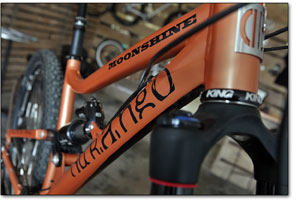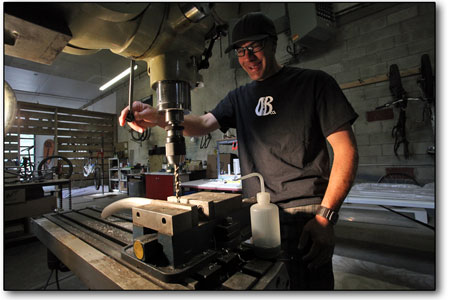|
Jeff Estes, owner of Durango Bike Co., drills a seat tube purge hole in his Durango shop. The new bike manufacturer recently opened at the bottom of Horse Gulch, where it sells a small but growing line of bikes made in the United States. Plans call for expanding the operation, someday offering outdoor seating and serving local food and beverage./Photo by Stephen Eginoire |
Gettin’ drunk on Moonshine
Durango Bike Co. brews high-tech rides the old-fashioned way
by Joy Martin
Drooling over shop talk? Mildly curious?You're invited to demo one or all of DBC's line of hard tails (the Puckers), full-suspension (the Moonshines) or fat bikes (the Hooeys). It's also not too late to sign up for the Strava Triple Threat Mountain Bike Challenge, which lasts till the end of June. You can win money... Learn more at durangobikecompany. com/blog/. |
“It is by riding a bicycle that you learn the contours of a country best, since you have to sweat up the hills and coast down them. Thus you remember them as they actually are,” Ernest Hemingway once said.
The first known cyclist to cross America was also a writer, George Nellis, a newspaperman who in 1887 mounted a 45-pound iron high-wheel with no gears and pedals attached directly to the front wheel. He followed railroads from New York to California, according to internet lore, completing the journey in 80 days.
Almost a hundred years later, the Race Across America (RAAM) debuted, a 3,000-mile bicycle race that now starts in Oceanside, Calif., and ends in Annapolis. The race has since seen only 200 riders from 25 countries cross the finish line and has been called “the toughest race in the world” by Outside magazine.
Tough but not impossible: in 2013, Austrian Chistoph Strasser shaved Nellis’ cruising record down to a speedy seven days, 22 hours and 11 minutes.
Leave it to a zealot from Colorado to enter the RAAM on a mountain bike, which Durango Bike Co. (DBC) owner Jeff Estes did in 1997. He and teammate Perry Stone currently hold the (only) record for finishing the RAAM on full-suspension mountain bikes in nine days, 17 hours and 43 minutes. Estes says he lost 39 pounds.
Estes said it was that kind of passion the fueled his latest venture with DBC. “I’m an avid bicyclist and I can’t get away from biking. It’s going to follow me to the grave, no doubt about it,” asserts Estes, a former pro who opened the doors to the local bicycle factory in December.
Conveniently located at the base of Horse Gulch, DBC is a family-owned enterprise, run by Estes and his wife, Wendy, a third-generation Durangoan. Her grandparents and parents were builders, mine owners and entrepreneurs. That legacy of hardworking stick-to-it-ness is now alive and well in Jeff and Wendy’s sons, Sampson, 16, and Rocco, 10, who help around the shop.
If you’ve been up Horse Gulch in the last four months, you’ve probably seen the warehouse doors, just east of 8th Avenue. The off-the-grid facility is run on 77 solar panels provided by Shaw Solar.
The DBC signage out front was a Christmas gift from Sampson and his welding classmates at Durango High School.
“He wants to build bikes, too,” explains Estes. “But who knows what he’ll end up doing. Kids change their minds.”
Estes hasn’t changed his mind though since he was 16 and first fell in love with two-wheelers. That was more than 25 years ago when he sold his dream car, a Volkswagen GTI, for a made-in-the-USA Gary Klein bicycle.
He’s been in the bike industry ever since, playing the roles of engineer, sales manager, professional mountain biker and now manufacturer.
Jeff’s resumé leading up to his founding of DBC includes names in the bike-world lexicon such as AMP Research, Dagger, Nite Rider and the famous Horst Leitner, who perfected the energy-saving rear-suspension link that changed mountain bike dynamics forever.
The patent for the Horst link, which Jeff was involved in testing in his early downhilling days, was bought by Specialized (and later renamed FSR.)
 DBC’s flagship full-suspension bike, the Moonshine./ Photo by Stephen Eginoire |
The patent finally ran out last year, giving Estes, who had been focused on building titanium hard tails, the final ingredient to start producing his own full-suspension bikes, featuring DBC’s bread-and-butter, the Moonshine.
“Before you drink a punch, try a Moonshine,” Wendy says. The bike is billed as a “no-nonsense bike unparalleled in its climbing ability, agility and speed.”
“It’s the bike we’re going to sell the most. I’m working on another batch of 20 frames as we speak,” says Jeff Estes.
The sexiest thing about DBC? They’re American-crafted.
Fact: In 2011, 99 percent of bicycles sold in the U.S. were imported from China or Taiwan, according to the National Bicycle Dealers Association. Ninety-nine percent.
Jeff recalls being at Interbike, an industry trade show, in 2012 and seeing a huge banner that read, “Think bikes: Think Taiwan.”
He was floored. “We need to bring manufacturing back to the United States. It’s sad that it’s not happening more swiftly in the bike industry,” he said. “(America) has the perfect craftsmen for it. We need to utilize that.”
According to Jeff, most U.S. bike companies buy parts from overseas and then throw their graphics on it.
Not so for DBC: “The tubing is custom-designed and engineered just for our bikes, delivered to our factory in Durango. We don’t buy anything off the shelves.”
The tubing thickness, Jeff explains, is designed so that a DBC aluminum bike weighs about the same as a carbon fiber bike. It’s mitered here in Durango before a quick trip to Phoenix, where masters of the trade (the same guys who piece together Apache helicopters and machine guns for the government) weld the frames.
“Our bikes are gravy versus what they’re welding now,” laughs Jeff.
Still in Phoenix, the welded frames are sent to one of the oldest family-owned heat treatment facilities in the United States, where they are heated to 985° and tested for optimal hardness, which makes the frame incredibly durable.
“That’s one reason we can give a lifetime warranty on the frame,” Jeff says proudly. “The longevity (of aluminum) outlasts carbon ten-fold. Carbon-fiber breaks down and gets weak.”
Having researched Formula One racecars before he landed on the ideal design for DBC bikes, Jeff noted that those cars, which are made out of carbon fiber, are fabricated to race only once. “After one race, it’s done. There’s so much stress that it breaks down.”
He’s transferring this knowledge to the construction of bikes: the bike is thick where it should be and thin where it should be to cut down on weight and ride more efficiently.
Back in Phoenix, the frame is powder coated, before being shipped back to Durango for assemblage (powder coating process is the next step that DBC plans to bring in house by the end of 2014).
Long story short, production takes three to four weeks.
This labor of love has not happened overnight for the Esteses. Instead of opting to lean on investors or loans, they founded The Stone and Paver Co. eight years ago. This masonry endeavor (you can see their handiwork at the Mesa Verde Visitor Center, the Student Union at FLC, Durango Mountain Resort and the Four Corners Monument, to name a few) produced enough money to open DBC’s doors.
Estes says he didn’t want to have to answer to anybody or be restricted to taking production to, say, Taiwan.
“We want to build about 500 bikes a year and keep all of the production right here. That’s our goal,” says Jeff.
Wendy adds that building a great product is the first start but the vision is much greater than mountain bikes. “We have some business philosophies that are not the norm in the industry, and as we grow, our philosophies grow and we hope these philosophies are what will keep DBC here for the long haul,” she said.
Like those of us who struggle to make it in Durango for the “long haul” and sometimes question what the heck we’re doing, Jeff proclaims that the thing that motivates him is that “this is the best place to live in the entire world.”
Amen, brother.
Between building bicycles and raising two active boys, the Esteses are busy nurturing other plans for DBC, including organized group rides, as well as putting out some chairs, tables and umbrellas and selling local treats like Zuberfizz, Desert Sun Coffee, Chip Peddler chips and (fingers crossed) ice-cold Ska beers.
But for these indulgences, one must wait.
“Our main focus right now is building bikes that push the limits of a persons’ ride, allowing them to ride longer and faster and then leaving them still wanting to have a beer at the end of the day,” says Jeff about the too-long-to-do list. “We want to ignite the passion in the gut so you can focus on having an amazing ride.”
A ride that, with a little sweat, will emblazon the contours of this country on your memory forever.
In this week's issue...
- December 18, 2025
- Let it snow
Although ski areas across the West have taken a hit, there’s still hope
- December 18, 2025
- Look, but don't take
Lessons in pottery theft – and remorse – from SW Colorado
- December 11, 2025
- Big plans
Whole Foods, 270 apartments could be coming to Durango Mall parcel

